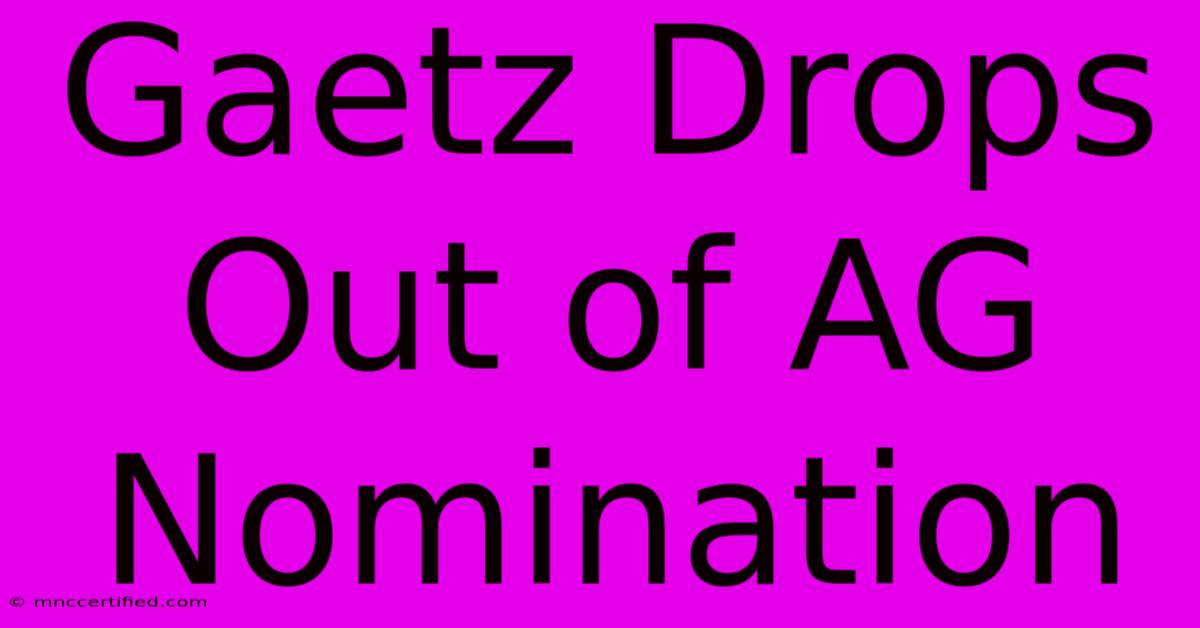Gaetz Drops Out Of AG Nomination

Table of Contents
Gaetz Drops Out of AG Nomination: What This Means for the Future
Matt Gaetz's surprising withdrawal from consideration for Attorney General has sent shockwaves through the political landscape. While the reasons remain somewhat opaque, the move has significant implications for the upcoming confirmation process and the future direction of the Department of Justice. This article delves into the details surrounding Gaetz's decision, exploring the potential motivations behind it and analyzing its impact on the political climate.
Why Did Gaetz Withdraw?
The official statement released by Gaetz's office cited a need to focus on his current congressional duties. However, speculation abounds regarding the true reasons behind his withdrawal. Several factors likely contributed to his decision:
-
Lack of Support: It's widely believed that Gaetz lacked sufficient support within the Senate for confirmation. His controversial past and outspoken rhetoric likely made him a difficult candidate for bipartisan support, a necessity for any successful Attorney General nominee. The potential for a protracted and highly contentious confirmation process likely played a significant role.
-
Ongoing Investigations: Gaetz remains under scrutiny for various investigations, including a federal sex trafficking probe. While no charges have been filed, the ongoing investigations undoubtedly presented a significant liability for his nomination. The intense media scrutiny accompanying such a high-profile position would have likely exacerbated the situation.
-
Strategic Calculation: Some political analysts suggest that Gaetz's withdrawal might be a strategic move, allowing him to maintain his influence within the Republican party while avoiding the potential pitfalls of a highly public confirmation battle. This move could allow him to continue his outspoken criticisms of the administration from a more secure position within Congress.
Impact on the Attorney General Nomination Process
Gaetz's withdrawal significantly alters the dynamics of the Attorney General confirmation process. The President will now need to consider alternative candidates, potentially restarting the vetting and nomination procedure. This delay could impact the Department of Justice's ability to address pressing issues. The search for a new candidate will inevitably involve a renewed focus on finding someone who can garner broader support and withstand intense scrutiny.
The Future of the Department of Justice
The choice of Gaetz's replacement will be crucial in determining the future direction of the Department of Justice. The new Attorney General will shape the department's priorities and approach to various legal and political issues. The selection process will be closely watched by both political parties and the public alike, with the nominee facing rigorous scrutiny during the confirmation hearings.
Long-Term Political Implications
Gaetz's decision has broader implications for the political landscape. It underscores the challenges faced by candidates with controversial pasts in securing high-profile government positions. Furthermore, it highlights the increasing polarization of American politics and the difficulties in achieving bipartisan consensus on crucial appointments. The fallout from this decision will likely continue to shape political discourse for some time to come.
Conclusion: Uncertainty Remains
While Gaetz's withdrawal provides a degree of clarity, significant uncertainty remains. The search for a new Attorney General will be a critical process, shaping the future direction of the Department of Justice and the broader political landscape. The reasons behind Gaetz's decision, though officially explained, remain subject to speculation and ongoing analysis by political commentators and experts. Further developments in this situation are eagerly anticipated.
Keywords: Matt Gaetz, Attorney General, AG Nomination, withdrawal, confirmation process, Department of Justice, political implications, Republican party, Senate confirmation, sex trafficking investigation, bipartisan support.

Thank you for visiting our website wich cover about Gaetz Drops Out Of AG Nomination. We hope the information provided has been useful to you. Feel free to contact us if you have any questions or need further assistance. See you next time and dont miss to bookmark.
Featured Posts
-
Is Aerolase Covered By Insurance
Nov 22, 2024
-
Full Coverage Hero Car Insurance
Nov 22, 2024
-
Browns Upgrade Blake Whiteheart
Nov 22, 2024
-
Cnbc India Adanis Us Fraud Accusations
Nov 22, 2024
-
Police Scotland Warning Storm Bert Travel
Nov 22, 2024